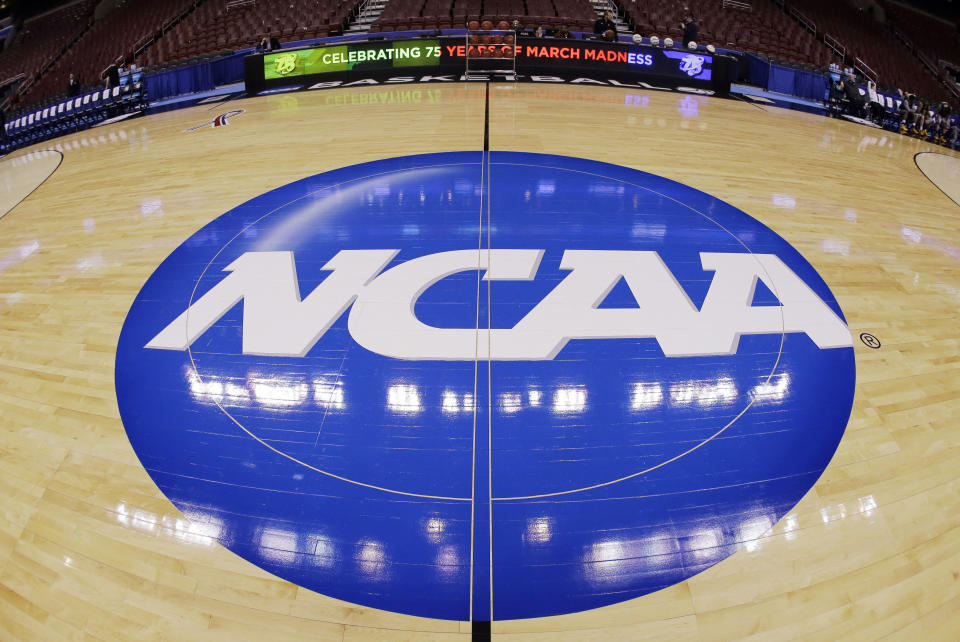NCAA staff members may be called in as witnesses in college hoops fraud case
If the college basketball fraud case reaches trial, prosecutors may call as witnesses NCAA staff members versed in the association’s complicated rule book, according to a letter obtained by Yahoo Sports that was sent by the U.S. Attorney’s office to the judges currently handling the case.
It is the most significant acknowledgement to date of how NCAA rules, which are industry regulations but not criminal laws, could play a role in the case. Additionally, it suggests further cooperation between the NCAA, the U.S. Attorney for the Southern District of New York and the FBI, which spent three years investigating the case before arresting 10 men in late September.
Joon H. Kim, the acting U.S. Attorney, mentions the potential for testimony about NCAA rules twice in a four-page letter sent to judges Edgardo Ramos and Lewis A. Kaplan.
He states there will be “background testimony regarding the NCAA rules and the responsibilities of Division I men’s basketball coaches.” Later in the letter, he states there, “will be witness testimony regarding the NCAA rules and the responsibilities of Division I men’s college basketball coaches.”
Defense attorneys have said what their clients have been charged with are not federal offenses. For instance, accepting a payment to steer clients to a particular sports agent, as four assistant coaches are generally alleged to have done, may be an abuse of their employment contracts with their respective schools by receiving outside payment, but they do not violate any federal law.
In a general explanation of a far more complicated argument, prosecutors have said that by violating NCAA rules, the men involved are defrauding the universities, which qualifies as a federal violation because they receive federal funding. In doing so, prosecutors are arguing, in essence, that breaking NCAA rules is criminal behavior, a turn from what was common believed and practiced for decades inside college athletics.

NCAA rules are written and ratified by the institutions of the NCAA, membership of which is voluntary. While the NCAA was essentially created by President Theodore Roosevelt in an effort to “encourage reforms” particularly to the safety of the game of football, it has never involved local or federal lawmakers to draft its rules or regulations.
The NCAA did not return a message seeking comment.
The letter also details that prosecutors will use “evidence obtained from wiretaps of the telephones used by” five men, financial planner Munish Sood, ex-Arizona assistant coach Emanuel “Book” Richardson, would-be sports agent Christian Dawkins and Adidas executives James Gatto and Merl Code. It also states that the feds have gained evidence via wiretap from the phones of ex-Auburn assistant Chuck Person and Atlanta clothier Rashan Michel. Some of this was revealed previously in complaints and indictments.
Richardson, Person, Michel, Dawkins, Gatto and Code have all been indicted and were arraigned this week in Lower Manhattan. All pled not guilty. Also indicted and pleading not guilty were ex-USC assistant Tony Bland and ex-Oklahoma State assistant Lamont Evans.
Sood and Florida-based AAU coach Brad Augustine were originally arrested in the Sept. 26 sweep but have not been indicted, leading to speculation from the other attorneys that they are already cooperating with authorities.
Neither the attorney for Sood nor for Augustine have responded to Yahoo Sports for comment.
A preliminary trial date for at least one of the cases in July 2018. The trials are expected to take between a month and six weeks.
More from Yahoo Sports:
• Durant: NBA Finals three over LeBron was ‘passing the torch’ moment
• One lingering question in UCLA Three saga
• Why Joey Votto deserves to win MVP (even though he won’t)
• Embiid trolls Lonzo Ball after Sixers dominate Lakers

